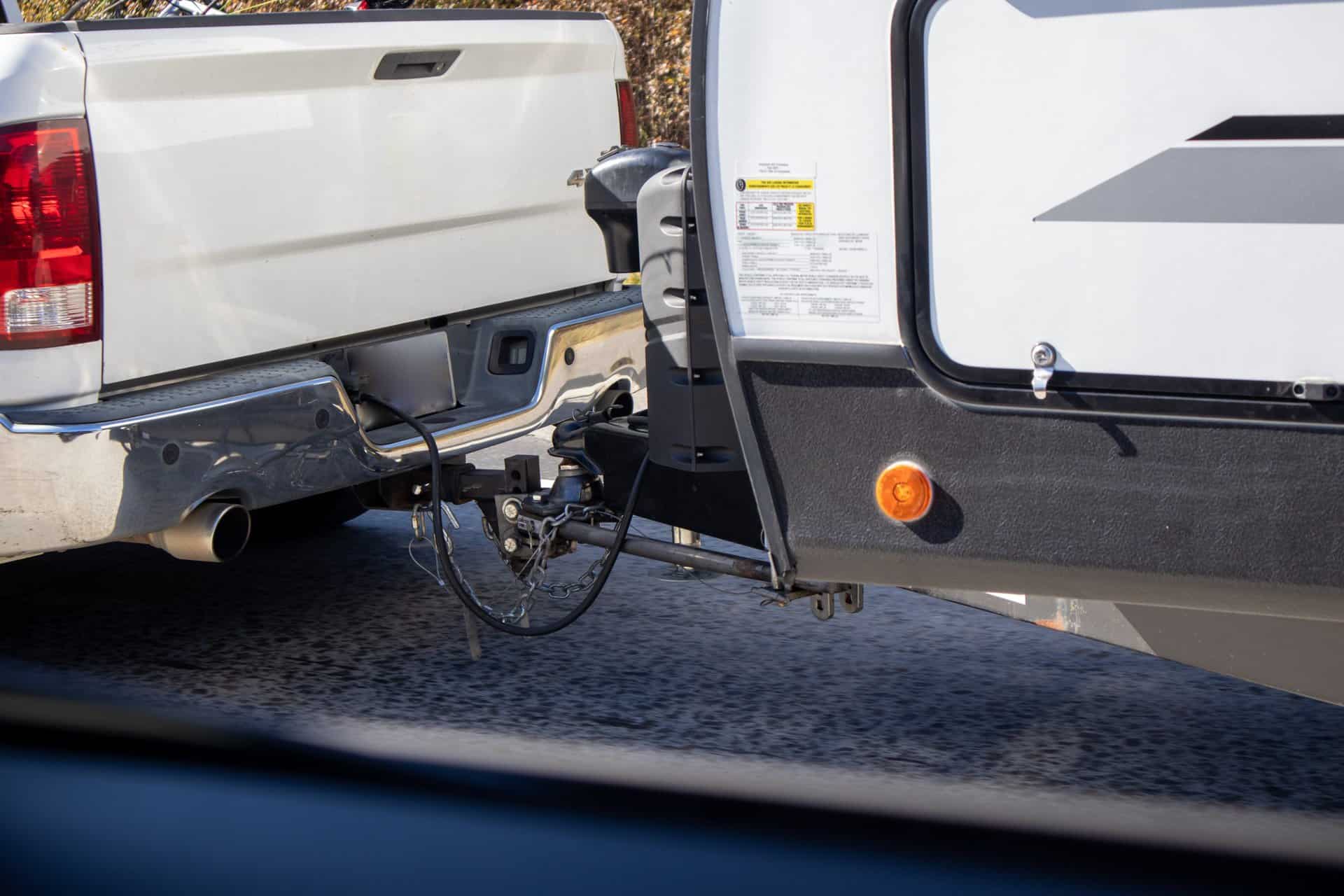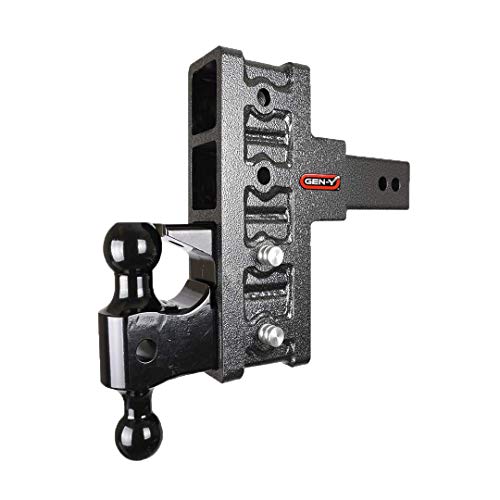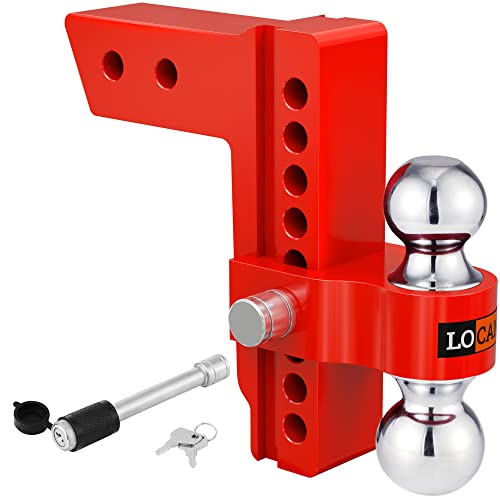Best Heavy Duty Trailer Hitch for Towing
In need of a heavy-duty hitch to tow a trailer with your truck or SUV? While these accessories can be easy to find, it’s not always quite so easy to choose the best hitch for your needs. They range quite a bit in price and quality, and the two do not always go hand-in-hand. Our team at Ultimate Rides knows a lot about hitches. We buy, sell, and build custom trucks and SUVs on a regular basis, and that includes upgrading the vehicles with the best towing hitches. In our time performing these upgrades, we’ve learned a lot about choosing the right trailer hitch, and we’re here to share that expertise with you so you can pick out the best heavy-duty hitch for your vehicle today.
Start by looking over our list below. It features some of the top choices to consider when shopping for a hitch for your truck/SUV and trailer. Each entry is accompanied by a short review to give you an idea of what to expect from that trailer hitch. After our list, our hitch receiver buying guide will offer more information on choosing, installing and using hitches, so you’ll be able to walk away with a lot more information than when you first arrived here.
Be sure to note that the maximum towing capacity listed for each hitch does not take into account the different drop heights offered by an adjustable trailer hitch. Depending on the setting you choose, the maximum amount you can tow will change, so be sure to carefully read the included instructions before you hit the road using any hitch.
If you have any questions, or need assistance with installation, don’t hesitate to contact Ultimate Rides. Otherwise, good luck on finding the best heavy duty receiver hitch!
1. GENY 2.5″ Mega Duty Offset Shank Adjustable Trailer Hitch
Specs: Fits 2.5″ Receiver, 3/8″ Side Plates 3/4″ Pin Holes, 6″ Drop, 3.5k Tongue Weight, 32,000 lbs. Max Towing Capacity
Do you need something truly heavy-duty to tow your trailer? This hitch could be the one for you. It’s not cheap, but it’s an advanced receiver hitch that can support an extreme amount of weight for heavy-duty towing. If you’re pulling along an RV or something heavy along those lines, you’re going to need a the best heavy-duty receiver hitch working for you, and this product certainly qualifies. It might take some getting used to driving with this hitch attached, but it will be worth it for everything it adds to your truck or SUV.
2. CURT 48012 Pintle Hitch Ball Mount
Specs: Fits 2.5″ Receiver, 2-5/16-Inch Trailer Ball, 20,000 lbs. Max Towing Capacity
Our next recommended hitch is much more affordable for everyday drivers, and still offers a solid trailer weight capacity of as much as 20,000 lbs. The hitch is not adjustable, which may be a turn-off for some, but it offers a dependable design that should work great for most trailer and vehicle configurations. As long as you’re not driving a lifted truck or SUV, this hitch will probably work out just fine for you. It’s easy to install, and the hitch features a spring-loaded arm and safety pin along with being weather-resistant. For all these reasons, it’s an easy choice to recommend the hitch to our readers as one of the best options for most trailer setups.
3. B&W Trailer Hitches Tow & Stow Towing Hitch
Specs: Fits 2.5″ Receiver, Tri-Ball (1-7/8″ x 2″ x 2-5/16″), 5″ Drop, 14,500 lbs. Max Towing Capacity
The next great hitch on our list comes from B&W, a top manufacturer of heavy-duty trailer hitches. It features a tri-ball trailer hitch mount design that can support a number of different trailer styles, and the hitch offers a maximum gross trailer weight of up to 14,500 lbs. The hitch is also adjustable, able to drop as much as five inches to accommodate lifted vehicles and differences in height between the vehicle and a trailer. This trailer hitch setup makes towing easy, with an installation process that should only take up a few minutes of your time, so you can get on the road towing your trailer faster. It’s another one of our favorite hitches coming from a reliable top brand.
4. CURT 45331 Trailer Hitch Mount
Specs: Fits 2″ Receiver, 2-5/16-Inch Ball & Pin, 2″ Drop, 15,000 lbs. Max Towing Capacity
By now, you’ve already see a CURT hitch appear on our list, and this option offers comparable quality. The biggest difference is that this hitch drops down two inches, though it isn’t adjustable. That means you’ll need to make sure it’s the right fit for your trailer before you buy. It fits in a two-inch hitch receiver, and offers great towing for a variety of trailer types. It can support a high amount of gross trailer weight and, like the other options on our list of the best hitches, it will only take a short amount of time to install. Take a look at this hitch and pick it up if you’re confident it’s the right fit for your vehicle and trailer.
5. LOCAME Adjustable Trailer Hitches
Specs: Fits 2.5″ Receiver, 2-5/16″ Hitch Ball, 8″ Drop/Rise, 18,500 lbs. Max Towing Capacity
If you need a versatile trailer hitch that will be able to support a variety of trailers, this pick is for you. It offers great variance in height, as well as a strong weight capacity for your trailer. Not all hitches can offer close to 20,000 lbs. of weight capacity, but this trailer hitch does, making it one of the best choices on our list for many situations. It may not be the most inexpensive hitch we have to recommend, but it will get the job done in a reliable way. Just be sure it’s the right fit for your needs before you buy.

Tracking Down the Best Trailer Hitch
In order to choose the best hitch for your needs, there are a few different factors you must consider. The first is finding a hitch that fits your vehicle. The most common types of receivers found on trucks and SUVs are 2 or 2.5 inches. Find out which you’re working with, and then ignore all hitches that don’t fit your receiver. It also helps to know exactly what you’ll be towing. Figure out how much it weights, including anything that you’ll be storing and transporting within the trailer. From there, you’ll want to start looking for hitches that can support the desired weight level. If you plan to tow heavier trailers in the future, make sure to account for the inevitable increase in weight.
If you are driving a lifted truck or SUV, you’ll need to pick out an adjustable hitch. Figure out the difference in height required to keep the trailer level, and make sure the hitch you choose can drop down to that amount or more. Otherwise, you won’t be able to safely tow any trailer.
Once you’ve made sure you’ll be able to tow your trailer safely, the last factor to consider is quality of construction. You want a hitch that’s durable, ensuring it will last a long time to come without requiring any replacement hitches.
Hitch Receiver Installation Tips
Most trailer hitches, even the best options, are usually pretty simple to install. It’s only when you start getting into the highly-expensive specialty hitch models that things become more complicated. This means that the majority of users will be able to simply and safely install their hitch right at home. Just make sure to have a basic toolset with you, and do a little bit of research to know what you’re getting into. Each hitch should come with a set of instructions for installation, and it should also provide information on how much you can safely tow at each height setting (assuming the hitch is adjustable). If you run into problems, take a look around for some video tutorials online that can walk you through the process. If all else fails, don’t be afraid to get in touch with a professional for assistance.
Safety Information for Hitches
Towing a heavy trailer can be dangerous unless you take the proper precautions. First, make sure that your vehicle is capable of safely towing such a heavy load. As we mentioned before, you’ll also want to check that your hitch is capable of handling that much weight, specifically at the height setting you need. If you ignore these restrictions, you’ll be putting others as well as yourself in massive amounts of danger, and you’ll likely cause a lot of damage to your vehicle and trailer. Gross trailer weight is an important figure to understand, so find out what you’re towing and make sure it doesn’t exceed any limits.
Before you get on the road with a trailer, it’s always a good idea to double check that everything is secured. Make sure whatever is attached to the hitch isn’t loose, and if you are utilizing a trailer brake, ensure that everything is properly connected. Make sure to also maintain a lower speed while out on the road, and keep more space between your vehicle and the one in front of you. That’s because it will take longer to come to a complete stop when towing anything heavy. If you follow these tips, you’ll be in great shape.





